Living in a town where household shelving and wall units are especially reserved for the children's bedrooms and not the lounge, it comes as no surprise that people don't buy much printed matter, apart from newspapers, which are probably bought for another purpose: despite the excessive number of dailies for the population of the country, they are produced en masse, and are filled with supplements. While lounging on the couch letting some mindless trash pass my eyes from the box (or the telly, as we used to call it New Zealand), an advertisement came on for the weekend's Sunday papers, most of which had probably already been printed, except for, possibly, the front page. Only the giveaways count in a newspaper these days, which is how newspapers sell in Greece: DVD's, CD's, fashion and decoration magazines, bags in the summer, scarves in the winter, everything 'free of charge' with the 'more expensive' edition of the newspaper. If there's no supplement, you can be sure that the newspaper won't be popular; even if there is a supplement, the paper is probably only being bought for that purpose. In Greece, we rarely take out household subscriptions.
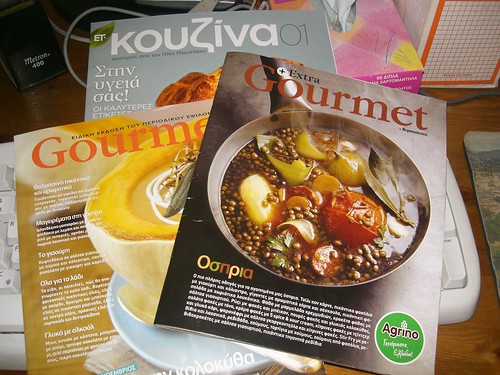
(Eleftheros Tipos offered a supplement with Mamalakis' recipes, while Kiriakatiki contained two supplements: one about beans and another about pumpkin)
A few weeks ago, there was a special Greek Gourmet magazine supplement in the Kiriakatiki Eleftherotipia, entitled Όσπρια' (Pulses - Beans). When he saw the advertisement on TV, hubby expressed great interest in procuring that particular newspaper, which we wouldn't have bought, had it not been for the supplement. My husband loves beans. He could eat fasolada every day, just like the Italians eat pasta as part of most main meals. He attributes his fanatical nature towards the humble bean to an unfortunate incident in his childhood, when he suffered from some peptic disorder. His mother took him to the doctor, who explicitly instructed her that her son should avoid all forms of gas-inducing food, which of course meant all kinds of beans. Much to his dismay, his mother would make fasolada for his father, another bean fanatic (the trait must be genetic - even one of the grandchildren seems to carry it), and cook a separate bland meal of boiled chicken and plain boiled rice for her son (which explains his present revulsion for chicken).
When the peptic disorder disappeared, and he no longer exhibited any symptoms of illness, he demanded a bowl of his mother's aromatic fasolada, but to no avail; his mother wanted to ensure that her son would never again suffer from any kind of peptic disorder, so she never let him eat any fasolada - for the next six years. One day, just before he became a teenager, my husband found a pot of fasolada simmering away unattended. He took the wooden spoon his mother used to stir the soup and ate a scoop of fasolada, just as it was, boiling hot. Then he ate another, and another, and another, until his mother came into the kitchen and caught him in the act.
"Get away from that pot!" she screamed, ranting lunatically out of fear for the worst, at the same time trying to expunge the spoon out of her son's hands. "The fasolada's gonna make your stomach explode!"
Her son made a run for it - but not before he took the pot with him. He ran a few hundred yards down the road, and hid in a nearby swamp (the present Gogoni Street in Hania), returning in the evening with the pot, completely empty of its contents. Since that day, nobody ever again attempted to stop him from eating fasolada, fava, lentil soup, black-eyed beans, chickpeas and yigantes, which pretty much covers the range of bean dishes his mother cooked in her kitchen.
So when he saw the advertisement for a 'free' magazine devoted wholly to bean recipes, he just had to have it.
"Don't bother," was my immediate reaction. "You won't want boiled lentils in your salad, mashed vegetables in your fava, kidney beans with bulgur wheat, grated carrot in lentil soup and yigantes with horta." He was astounded to hear these combinations being named by his wife, as I had never cooked them in our own home, nor had he heard of them being cooked in other homes. I explained to him the trend in Greek cuisine to 'update' an old favorite, use traditional ingredients in a novel way, basically, to cook in a more globalised fashion while still maintaining a Greek-Mediterranean element in the food. These new ideas were implemented by creative Athenian cooks, and are now permeating into Athenian restaurants, Greek food websites and younger people's cooking), but whose effects have not yet made an impact in the everyday Crete we live.
Not, of course, that there is anything wrong with inventing new recipes, revamping old ones, or giving a new look to age-old recipes. It just doesn't work in this environment, where people have been brought up on a traditional cuisine that hasn't changed much since the period of the Turkish occupation of the island. I don't need to tell you what might happen if I tweaked the basic recipes I use for my rotational weekly cuisine according to the season: the Third World War will break out from my kitchen.
I showed my hunter-hubby one of the recipes in one of the supplements: quails in a mustard and sage or tarragon) sauce, served with baked honey-glazed quince: 'Παπάρια' (paparia; 'balls'), leaving me simply to savour the photographs in the magazine for the time being. My reasons for rejecting someone else's recipe is based on other factors:
- Recipes (no matter how attractive they look) which use hard-to-source (therefore not local or well-known) ingredients are definitely not for my kitchen. It's great to try out new products, but do it on your own, unless you are sure that your family is more welcoming of new tastes, exotic aromas and quirky looking edibles.
- I sympathise with some people's abhorrence at mixing sweet or fruit ingredients into a savoury dish, although this is more a matter of how one has become conditioned to view food rather than a genuine dislike of the combination of sweet and savoury; these kinds of meals were probably never cooked in their home in the first place.
- When recipes call for the use of processed ingredients like ketchup, mayonnaise, baking mixes, and other unnatural or processed foods as their main ingredients, I feel they are simply trying to sell a product line, not trying to create a wholesome meal.
*** *** ***
In Hania, people are stuck on old food favorites. The previous generation of cooks will pass on recipes to the next generation. What is served at home is also served in tavernas. Our tourists are used to this; they say it helps them to recognise what they're eating:
"Stifado? Oh, we had that in XYZ taverna."
"Biftekia? Oh, that's what we tried in ABC taverena."
"Yemista? Oh, my favorite recipe website featured those once on a Greek food special."
They won't forget those words or those tastes easily; they appear in all the menus of all the tavernas in the region. The Cretan mayeirio delivery menu (aimed mainly for busy working people) doesn't differ vastly from such tourist menus; almost everything that appears in my recipe index is listed in a typical mayeirio menu card, arranged in the typical way a Cretan mayeirio displays its wares. The menu is in Greek; an English translation is provided with links to my own site recipes:
SALADS - APPETISERS Horiatiki with feta - Seasonal salad: lettuce/cabbage - Horta: stamnagathi/vlita - Beetroot - Feta per serving - Potatoes fried in olive oil BOILED MEAT Goat - Beef - Patsa soup ROAST MEAT Beef steak - Pork steak - Lamb chops - Pork strip (Greek pancetta) - Biftekia - Roast chicken STEWS Sheep guts with courgettes - Fricasse with lettuce or horta - Lamb stew - Pork with celery - Pork with peppers - Lamb with artichokes - Soutzoukakia - Beef stew - Lamb with beans - Yiouvetsi - Yiouvarlakia - Rabbit stew - Chicken with okra - Roast lamb and potatoes - String beans in tomato sauce - Gigantes beans with bacon - Spaghetti with mince SUMMER DISHES Moussakas - Pastitsio - Boureki - Yemista - Papoutsakia - Briam - Eggplants with cheese WINE House wine: red or white - Retsina - Beer - Soft drinks
'Nouveau cuisine' in Hania still has a long way to go. When I showed my husband a menu card from an Athenian mayeirio, he asked me who eats such food. Probably all sorts of people, mostly young people, progressive people, people tired of eating the same kind of food their mother makes at home, people game to try a new taste, people keen to avoid fatty meals with an excess of olive oil, people interested in new tastes, people on the road, people busy at work, hungry people who do not have the luxury of using fresh garden produce, the space to cook an elaborate meal or the time to do it. The menu card from this Athenian mayeirio reads very differently; there is not even any menu arrangement:
Meat soup with vegetables and cereals - Tuna cabbage salad with warm rice - Roast vegetable medley and cheese - Rocket salad with chicken, pineapple and mango - Boiled vegetables in a vinaigrette sauce - Green salad with smoked salmon and shrimp - Fried cuttlefish with eggplant sauce - Wholemeal pasta with broccoli - Wholemeal penne with sauce and goat's cheese - Yiouvetsi with shellfish or mushroom medley - Tomato carbonara - Salmon with dill and rice - Fried cod with skordalia - Moussakas - Meatballs with rice, sauce, peppers and mint - Meatballs with pasta and fennel - Lamb with coastal horta - Roast chicken with boiled vegetables - Rabbit with pergamon and mashed potato - Chicken with estragon and rice - Fillet steak with mushrooms and home-made pasta - Fillet steak with pistachio and rosemary
(The meals become progressively more expensive as you read the list...)
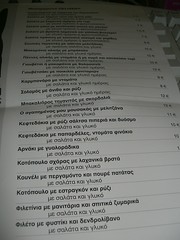
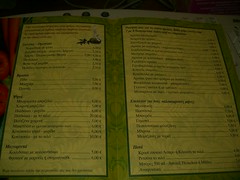
©All Rights Reserved/Organically cooked. No part of this blog may be reproduced and/or copied by any means without prior consent from Maria Verivaki.
(The meals become progressively more expensive as you read the list...)


The two mayeirio menu cards: for those of you who don't read Greek, which one do you think is from Hania, and which is from Athens?
The meals mentioned in the Athenian mayeirio sounds nutritious and tasty. But they aren't cooked in the traditional Cretan kitchen. Wheat may be added to a meat soup, but pineapple and mango would never feature in a savoury dish, even if both are readily available fresh (they simply decorate the supermarket fresh produce counter, or are bought by foreigners, from what I know), cuttlefish and eggplant sauce wouldn't be served together, neither would meatballs and fennel... and so on.
There are many many times when I wish for something different, even if it means I have to cook it just for myself; if it doesn't look familiar, my family generally doesn't want it. That being said, at least they know what they want; some people are still searching.
I was recently inundated with weird and wonderful vegetables, which I had to use up somehow, even though I had never before used them in my cooking.
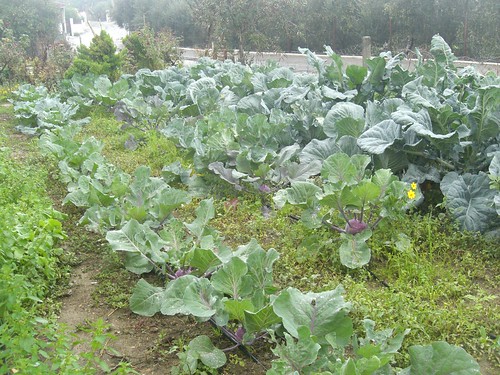
(Until my uncles started growing it this year - just for fun - I had never even seen kohlrabi before in my life; purple on the outside, white on the inside, it smells and tastes of cabbage.)
I actually invented a recipe for a salad. Although recipe creation is not my forte, I think I pulled it off quite nicely. I thought it would look great in one of those cuisine magazine supplements. Now all I need is to figure out a name for it...
You need:
1 small Daikon radish
1 kohlrabi
1 carrot
1 spring onion
a few sprigs of parsley OR rocket leaves
salt
olive oil
balsamic vinegar (optional)
Grate the radish, carrot and kohlrabi into a bowl. Chop the spring onion and parsley or rocket finely, and add to the other vegetables. Dress the salad with salt and olive oil. A sprinkle of balsamic vinegar woudn't go amiss, either.
Enjoy as a side dish with a main course, or as a main dish with some good cheese (and red wine).
The meals mentioned in the Athenian mayeirio sounds nutritious and tasty. But they aren't cooked in the traditional Cretan kitchen. Wheat may be added to a meat soup, but pineapple and mango would never feature in a savoury dish, even if both are readily available fresh (they simply decorate the supermarket fresh produce counter, or are bought by foreigners, from what I know), cuttlefish and eggplant sauce wouldn't be served together, neither would meatballs and fennel... and so on.
There are many many times when I wish for something different, even if it means I have to cook it just for myself; if it doesn't look familiar, my family generally doesn't want it. That being said, at least they know what they want; some people are still searching.
*** *** ***
I was recently inundated with weird and wonderful vegetables, which I had to use up somehow, even though I had never before used them in my cooking.

(Until my uncles started growing it this year - just for fun - I had never even seen kohlrabi before in my life; purple on the outside, white on the inside, it smells and tastes of cabbage.)
I actually invented a recipe for a salad. Although recipe creation is not my forte, I think I pulled it off quite nicely. I thought it would look great in one of those cuisine magazine supplements. Now all I need is to figure out a name for it...
You need:
1 small Daikon radish
1 kohlrabi
1 carrot
1 spring onion
a few sprigs of parsley OR rocket leaves
salt
olive oil
balsamic vinegar (optional)
Grate the radish, carrot and kohlrabi into a bowl. Chop the spring onion and parsley or rocket finely, and add to the other vegetables. Dress the salad with salt and olive oil. A sprinkle of balsamic vinegar woudn't go amiss, either.
Enjoy as a side dish with a main course, or as a main dish with some good cheese (and red wine).
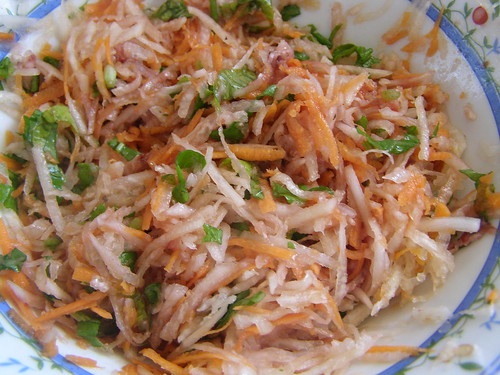
Another informative and interesting post Maria. It's interesting reading about the diet of Greeks in Greece and the popularity of this "nouveau cuisine". Now, as for your dish how about "Cretan Kohlrabi"...not very inventive I know!
ReplyDeleteI like beans too, but avoid them due to the explosive effects they have on my lower intestine and my desire to stay married. I hope for your sake your husband does not suffer from this affliction!
ReplyDeleteWith regards to recipes with Ketchup and Mayonnaise - I probably agree with you - to a point. I think these days things like Ketchup and Mayonnaise have essentially become 'ingredients' a bit like Worcestershire sauce has. If you buy good quality ones, they are completley natural products (even Organic varieties are available). Of course, I can't think of any Greek food that may include ketchup, but if you want to make awesome BBQ ribs with a sticky sauce, then it is a prime ingredient!
Your mention of a swamp in Hania brought back some childhood memories. I used to go to a swamp somewhere in Hania (can't recall exactly where) with a local family friend to search out a specific kind of bush which was used to make home-made slingshots. The branches of this bush had just the right Y-shape and flexed just enough to make this awesome hunting tool.
A bit of cut up inner-tube for an elastic and some offcuts of leather for the pouch, and you had a nice harhala. My uncles used to hunt for small birds with these as children (are there any birds left at all in Crete??) I'm sure your husband will know about this :-)
Hi Aris (that coffee story's done)
ReplyDeleteMy husband is 52 - he lived in the Gogoni St area, so he regularly passed by the swamp. He told me that before the road was concreted, the area was a hunter's paradise. Near the road, there are huge fields which remain planted with the same trees that he remembers as a boy. The area was known as MANOS, close to PELEKAPINA. Just recently a new road has been built through the fields. It has made the area more visible to the locals. Before, it was considered private property, but the owners don't actually live there (they are abroad).
I honestly don't know where this swamp was - my memories of Hania are one of a pre-teen (and i'm 39 now). Every thing was walking distance from my grandmothers house which was (I believe) in the Jewish Quarter 'Sta Vreika' (I think it was on or near an old jewish graveyard). We walked to the limani, we walked to the sea (about 5 mins walk) to dive for sea urchins (ahinous - totally delicious), and to the lovely indoor market in Chania. I don't remember the name of the road, but can find out.
ReplyDeleteovraiki is next door to nea hora - nea hora is bordered by kladisos river - kladisos (still a slightly swampy area) is the road that was recently constructed (the traffic lights are going to start working this weekend). i wonder if we are talking about the same place...
ReplyDeletecheck out what has been built by kladisos river near the partly swampy bit:
http://haniadailyphoto.blogspot.com/2008/08/day-camp.html
this place borders the newly built overpass
I enjoyed reading about your husbands overcautious and beanless first few years. I can't imagine having celiac disease or having to have a gluten or wheat free diet. Living in a country the size of Canada with a melting pot of cultures eating a diverse diet is an every day occurance as I am sure it was in New Zealand. When in Greece I longed for the authentic but after a while my daughter and I tried to seek out a big, fat juicy hamburger. My last 8 days were spent with Aglaia Kremezi at her cooking school on Kea who is very forward thinking. I can't wait for her new cookbook to come out in the Spring...Mediterranean - Hot and Spicy!!
ReplyDeleteHere is where my Grandmother lived. The swimming pool you see there is where I learned to swim. To be honest though, I was more interested in getting the chocolate Eclair which was given out afterwards. I also recall getting a glass of dodgy milk with a layer of fat or something skimming the top (I didn't like that bit).
ReplyDeletehttp://tinyurl.com/6r9bqo
This photo seems a bit out of date. Multimap have a better version - my mom says the smoke stacks next to that new school used to be a soap factory.
http://tinyurl.com/6dbqfx
The rocks between the swimming pool and the little harbour is where we used to dive for achinous. Lovely memories.
you know that's nea hora we're looking at in the photos! - the soap factory is ABEA - it stopped working in the area on the grounds that it was environmentally unfriendly and inappropriate in a tourist-infested area
ReplyDeleteHi! thanks for the comments - here is the link to the slipper pattern - stardustshoes.blogspot.com.
ReplyDeleteLoved your post! I tend to try lots of new recipies, but often end up substituting. After cooking dinners for my husband for almost 14 years (yikes!) I pretty much know what flavors he likes, so even with a new recipe (plus my substitutions/additions) - it ends up tasting similar to everything else!
Growing up, my dad had VERY specific tastes and major dislikes - my poor mom had to cook the same things over and over. maybe that's why as adults my sister and I are drawn to "new" foods (read - "new to us!")
Out of all the magazine inserts offered in the newspapers, I found Gastronomos to be the most useful and true to Greek ingredients.
ReplyDeleteAs for your salad, I like your use of Daikon and I think it works with some Greek dishes.
Interesting, funny, well-written; I really enjoyed this posting. It made me miss being in Greece, however. There's nothing I enjoy more than buying one or two or even three Sunday papers and spending the quiet hours after lunch reading through them. And, you're right about the supplements. I go though the news sections quickly, dipping into articles here and there, but the supplements, especially the food sections, I read every page. Your husband and the beans is a great short story in itself. And then there's the insightful commentory on modern Greek cooking. Great job, Maria.
ReplyDeleteI loved this!
ReplyDeleteThat salad looks great - with a bit of cheese and wine it'd totally be a main dish! totally!
-DTW
www.everydaycookin.blogspot.com
Hi Maria,
ReplyDeleteThanks for another great story!
Hi Maria!
ReplyDeleteI like your blog very much! Have been reading it for a while now and I guess it's about time for me to write something. :)
I love the idea of your salad and I can even imagine it as pickled! I'll definitely give it a try. Maybe with adding some mustard to the dressing...
This is another impressive post Maria. Bravo my dear!
ReplyDeleteI love the story of your husband running away with the cooking pot and not coming back till he'd polished the lot off! That's hilarious!
ReplyDeleteI'm with your husband...can't live without beans! I love the story about running away with the pot! Funny.
ReplyDeleteEnjoyed reading the post.The part about your husband's craving for beans reminds me about how I usually avoid butter in my son's diet.One can survive without butter but not without beans:)
ReplyDeleteThat's a crunchy bowl of salad with freshest ingredients,love all the flavors in it.